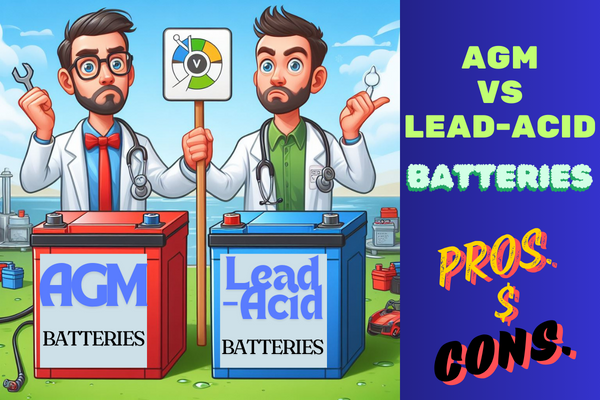AGM vs. Lead-Acid Batteries:
AGM (Absorbent Glass Mat) batteries and lead-acid batteries are two types of batteries that are widely used but have different features and applications. In this post, we’ll look at the differences between AGM batteries and traditional lead-acid batteries, including performance, maintenance requirements, longevity, and applicability for different applications.
AGM Batteries:
AGM batteries are a type of valve-regulated lead-acid (VRLA) battery that uses absorbent glass mats to trap the electrolyte. This design offers several advantages over traditional flooded lead-acid batteries.
Read more About AGM Batteries in detail:
Pros of AGM Batteries:
-
Maintenance-Free Operation:
- One of the significant advantages of AGM batteries is their maintenance-free operation. Unlike flooded lead-acid batteries, AGM batteries do not require regular topping up of electrolyte levels. This makes them ideal for applications where maintenance is difficult or impractical, such as in vehicles or remote solar power systems.
-
Vibration Resistance:
- AGM batteries are constructed with a fiberglass mat separator that absorbs the electrolyte and holds it in close contact with the lead plates. This design makes AGM batteries more resistant to vibration and shock, making them suitable for use in vehicles, boats, and off-road equipment.
-
Deep-Cycle Capability:
- AGM batteries excel in deep-cycle applications, meaning they can be discharged and recharged repeatedly without significant degradation in performance. This makes them ideal for use in renewable energy systems, electric vehicles, and backup power applications.
-
Leak-Proof Design:
- AGM batteries are sealed units, preventing electrolyte spills even if the battery is damaged or tipped over. This feature enhances safety and allows AGM batteries to be used in indoor applications without the risk of acid leakage.
Cons of AGM Batteries:
-
Higher Initial Cost:
- AGM batteries typically have a higher upfront cost compared to traditional lead-acid batteries. This can be a consideration for budget-conscious consumers, although the long-term benefits may outweigh the initial investment.
-
Limited Lifespan:
- While AGM batteries have a longer lifespan than flooded lead-acid batteries, they may not last as long as other types of batteries such as lithium-ion. AGM batteries typically have a lifespan of 4 to 7 years, depending on usage and charging conditions.
Now in this Post “AGM vs. Lead-Acid Batteries” we are clear about AMG batteries now we will look into the Lead-Acid Batteries.
- While AGM batteries have a longer lifespan than flooded lead-acid batteries, they may not last as long as other types of batteries such as lithium-ion. AGM batteries typically have a lifespan of 4 to 7 years, depending on usage and charging conditions.
Lead-Acid Batteries:
Lead-acid batteries are the traditional type of rechargeable battery, commonly found in vehicles, boats, and backup power systems.
Pros of Lead Acid Batteries:
-
Low Initial Cost:
- Lead-acid batteries are generally more affordable upfront compared to AGM batteries, making them a popular choice for budget-conscious consumers.
-
Widespread Availability:
- Lead-acid batteries are widely available and come in various sizes and configurations, making them easy to find for most applications.
-
Simple Maintenance:
- While lead-acid batteries require periodic maintenance such as checking electrolyte levels and topping up with distilled water, the maintenance process is relatively straightforward and can be performed with minimal tools and equipment.
Cons of Lead Acid Batteries:
-
Maintenance Requirements:
- Regular maintenance is necessary for lead-acid batteries to ensure optimal performance and longevity. This includes checking electrolyte levels, topping up with distilled water, and cleaning terminals.
-
Limited Mounting Options:
- Lead-acid batteries must be kept upright to prevent electrolyte spills. This limitation may affect installation options in certain applications where space is limited or unconventional mounting positions are required.
-
Susceptibility to Vibration:
- Lead-acid batteries are more susceptible to damage from vibration and shock compared to AGM batteries. This can be a concern in mobile applications such as vehicles and boats, where vibrations are common.
This was the whole comparison of AGM vs. lead-acid batteries.
- Lead-acid batteries are more susceptible to damage from vibration and shock compared to AGM batteries. This can be a concern in mobile applications such as vehicles and boats, where vibrations are common.
In conclusion, both AGM vs. lead-acid batteries have advantages and disadvantages, and the choice between the two is determined by the application’s specific requirements. AGM batteries provide maintenance-free operation, vibration resistance, and deep-cycle capabilities, making them ideal for a variety of applications, particularly when dependability and convenience are critical. Lead-acid batteries, on the other hand, are less expensive to purchase and more generally available, but they require frequent maintenance and may not be as robust or adaptable as AGM batteries. Understanding the benefits and drawbacks of each battery type can help consumers make informed decisions based on their needs and goals.
Hope you liked our article on “AGM vs. lead-acid batteries”.
FAQ
FAQs (Frequently Asked Questions) about AGM vs. Lead-Acid Batteries:

3 thoughts on “AGM vs. Lead-Acid Batteries (2024) Pros and Cons (Which is Best ?)”